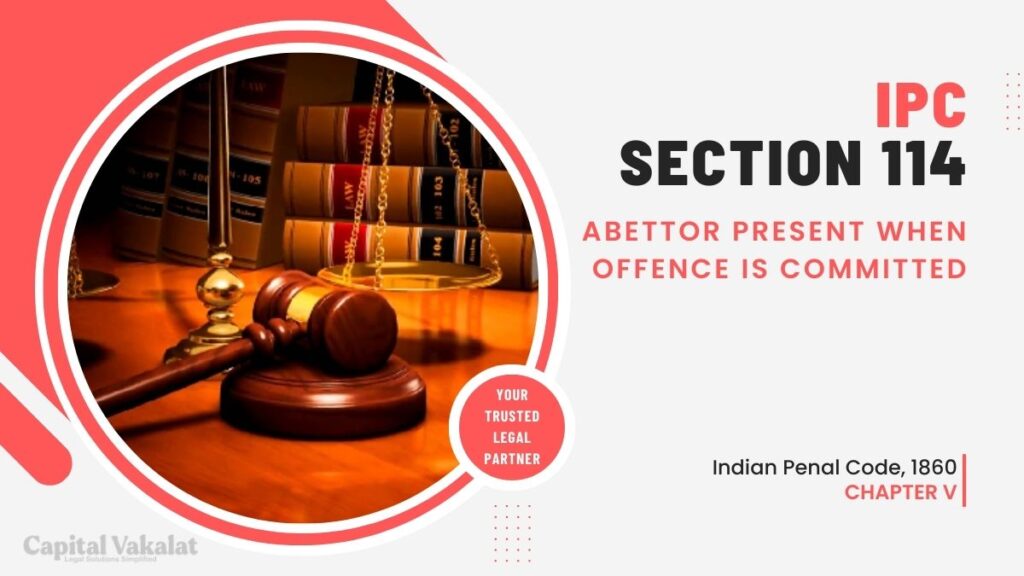In the realm of criminal law, Section 114 of the Indian Penal Code (IPC) plays a significant role. This legal provision pertains to the presence of an abettor when an offence is committed.

To comprehend the nuances of this section, it is crucial to delve into its elements, interpretations, and its role in criminal cases.
Understanding Section 114 IPC
Section 114 IPC essentially deals with the concept of abetment. Abetment is the act of aiding, instigating, or engaging in a conspiracy to facilitate the commission of an offence. This section focuses on situations where the abettor is physically present when the offence is committed.
Who is an Abettor?
An abettor is an individual who intentionally aids or encourages the commission of a crime. They may not be the primary offender but play a vital role in the commission of the offence. Their presence and involvement are essential to establish guilt under Section 114.
Elements of Section 114 IPC
Mens Rea (Criminal Intent)
Mens rea refers to the mental state or intent of the abettor. To establish guilt, it must be proven that the abettor had the intent to facilitate the crime. Mere presence without a criminal intent may not suffice to invoke Section 114 IPC.
Actus Reus (Criminal Act)
The abettor’s act or participation in the crime’s commission is the actus reus element. It’s not limited to mere presence; active involvement is essential to establish guilt under this section.
Proving the Presence of an Abettor
Proving the presence of an abettor can be challenging. It requires substantial evidence to link the abettor’s presence with the commission of the offence. Witness testimonies, CCTV footage, or any other relevant proof may be used to establish this connection.
Types of Abetment
Abetment can take various forms:
- Instigating: Encouraging someone to commit a crime.
- Engaging in a Conspiracy: Collaborating with others to plan and execute a criminal act.
- Aiding and Assisting: Providing support or resources for the commission of the offence.
Legal Consequences of Abettor’s Presence
An abettor present during the commission of an offence can be held liable as if they committed the crime themselves. They may face the same penalties as the primary offender, depending on the seriousness of the crime.
Cases Illustrating Section 114 IPC
To understand the practical implications of this section, let’s explore a few real-world cases where Section 114 IPC was invoked.
- [Case 1]: In a bank robbery, an accomplice who waits in the getaway car is charged under Section 114 IPC.
- [Case 2]: A person who supplies a weapon to a murderer and accompanies them to the crime scene may be charged under this section.
Landmark Judgments
Several landmark judgments have clarified the interpretation and application of Section 114 IPC. These cases set important legal precedents.
Criticism and Controversies
Despite its significance in criminal law, Section 114 IPC has not been without controversy and criticism. Some argue that it may lead to unfair convictions, especially in cases where the abettor’s role is minimal.
The Role of Abettor in Criminal Cases
Abettors often play a pivotal role in criminal cases. They are not always the mastermind behind the crime but can significantly contribute to its execution.
Necessity of Evidence
The prosecution must provide compelling evidence to prove the abettor’s presence and involvement beyond a reasonable doubt. The burden of proof is high.
Defenses Available to Abettor
Abettors can raise defenses such as lack of intent, coercion, or duress. These defenses may mitigate their liability.
Recent Amendments
It’s essential to stay updated with any recent amendments to Section 114 IPC, as changes in the law can have significant implications for cases involving abettors.
Conclusion
Section 114 IPC, which addresses the presence of an abettor when an offence is committed, underscores the importance of intent and active involvement in criminal cases. It serves as a crucial tool in holding individuals accountable for their participation in crimes.
FAQs
How can the presence of an abettor be proven in court?
Proving the presence of an abettor requires substantial evidence, including witness testimonies, surveillance footage, or other relevant proof.
Can abettors raise defenses in court?
Yes, abettors can raise defenses such as lack of intent, coercion, or duress, which may mitigate their liability.
What are the legal consequences for abettors under Section 114 IPC?
Abettors may face the same penalties as the primary offender, depending on the nature and severity of the offence.
Are there recent amendments to Section 114 IPC?
It’s essential to stay informed about any recent amendments to Section 114 IPC, as changes in the law can impact cases involving abettors.